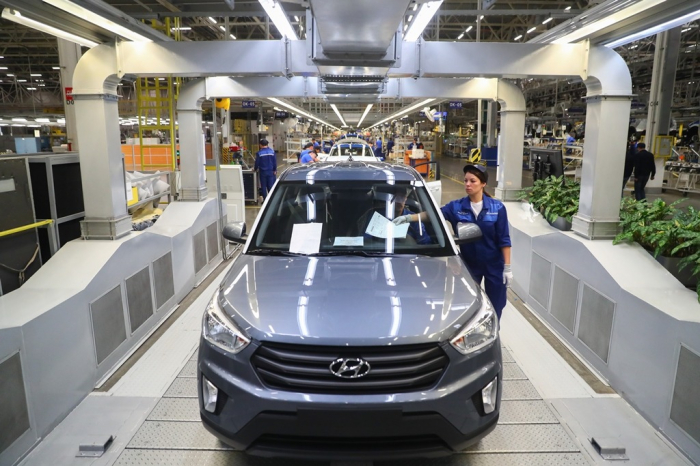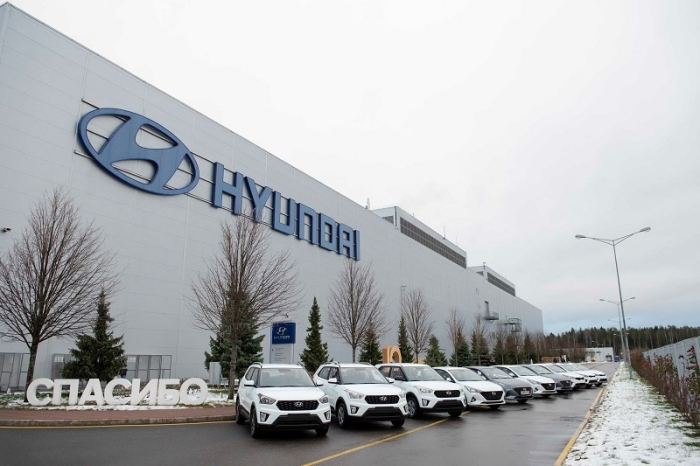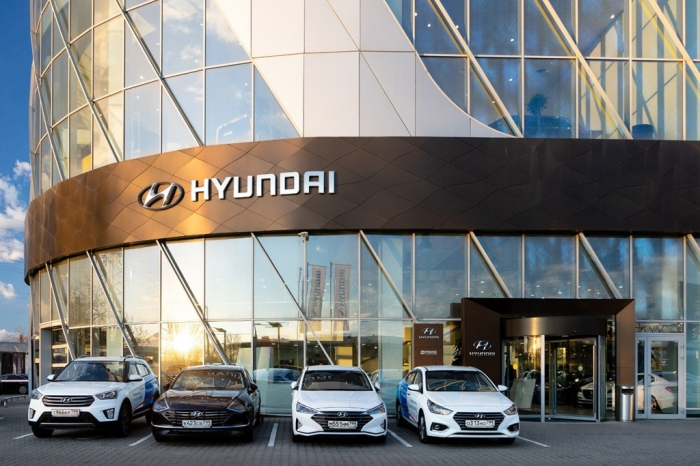Hyundai to sell Russian car plants at about $100 for exit
Hyundai agrees on an option to buy back the assets at the sale price in two years, but there is some doubt about its return
By Dec 19, 2023 (Gmt+09:00)
LG Chem to sell water filter business to Glenwood PE for $692 million


KT&G eyes overseas M&A after rejecting activist fund's offer


Kyobo Life poised to buy Japan’s SBI Group-owned savings bank


StockX in merger talks with Naver’s online reseller Kream


Meritz backs half of ex-manager’s $210 mn hedge fund



Hyundai Motor Co., South Korea’s top carmaker, has decided to sell its plants in Russia for only about $100 to a local company although it has kept the door open for a possible return, joining other global automakers to leave the market as the protracted war between the country and Ukraine dampened business in the world’s largest country by area.
The maker of the IONIQ electric vehicle series said on Tuesday its board of directors decided to sell the entire stake in its Russian operations including its plant in St. Petersburg with an annual capacity of 230,000 automobiles and a nearby factory acquired from General Motors Co. with a capacity of 100,000 units.
Hyundai is set to dispose of the assets for 10,000 rubles ($111.2) to Art-Finance LLC, a subsidiary of Russian auto dealer Avilon, which has been touted as a strong candidate to buy Hyundai Motor Manufacturing Rus LLC (HMMR), industry sources in Seoul said. Art-Finance acquired German automaker Volkswagen Group’s Russian assets this year.
“We have been considering various measures to sell Russian plants in optimal ways,” said a Hyundai official in Seoul. “We decided on the sale (now) as this is the most appropriate time.”
The South Korean automaker is expected to suffer a major accounting loss from the deal, given the book value of 287.3 billion won ($219.6 million) for the Russian assets.
Hyundai, however, agreed on an option with the Russian government to buy back the assets at the sale price in two years.
Renault, which was the No. 1 carmaker in Russia, sold its majority stake in automaker AvtoVAZ to an auto research institute for one symbolic ruble in May last year with an option to buy the stake back.
SURGING FIXED COSTS
Hyundai, the world’s third-largest automaker along with its affiliate Kia Corp., made the decision after the suspension of production in Russia for one year and nine months following the country’s invasion of Ukraine. That compared with other major carmakers such as Renault and Toyota Motor Corp., which quit operations there last year.
Hyundai has been expanding its business in Russia to become the country’s No. 2 carmaker by selling more than 230,000 vehicles.

The South Korean carmaker increased new models for the market even as other carmakers including GM withdrew from Russia due to US’ sanctions against the nation in 2014 and lower oil prices. In 2020, Hyundai invested more in Russia by taking over one of the GM plants. Sunk costs related to such investments made it hard for Hyundai to give up on the market, industry sources in Seoul said.
The prolonged Russia-Ukraine war caused Hyundai to eventually exit from the country spanning Eastern Europe and Northern Asia. The company was estimated to have logged a loss of 550 billion won from fixed costs last year as it suspended production in Russia, analysts in Seoul said. The longer a company isn't manufacturing, the more its fixed costs increase.
LEAVING DOOR OPEN FOR RETURN?
Hyundai plans to consider a return to the country in the next two years, which could be challenging as Russian and Chinese rivals are rapidly expanding their market shares in the absence of global major automakers, industry sources in Seoul said.
The combined market share of Hyundai and Kia nosedived to almost zero from 26.5% in the first quarter of 2022 when Russia launched its initial attack on Ukraine.

The company is considering investments of up to hundreds of millions of dollars to double EV production capacity at its plant in Nošovice, Czech Republic, its sole eco-friendly car factory in Europe.
Write to Nan-Sae Bin at binthere@hankyung.com
Jongwoo Cheon edited this article.
-
 AutomobilesHyundai Motor set to exit Russia with St. Petersburg plant sale to AGR
AutomobilesHyundai Motor set to exit Russia with St. Petersburg plant sale to AGRSep 14, 2023 (Gmt+09:00)
2 Min read -
 AutomobilesAnother war in Russia: Hyundai, Kia versus Chinese carmakers
AutomobilesAnother war in Russia: Hyundai, Kia versus Chinese carmakersApr 21, 2023 (Gmt+09:00)
2 Min read -
 AutomobilesKia mulls investing $754 mn in China instead of Russia
AutomobilesKia mulls investing $754 mn in China instead of RussiaNov 16, 2022 (Gmt+09:00)
4 Min read -
 AutomobilesHyundai Motor between rock and a hard place over Russia operations
AutomobilesHyundai Motor between rock and a hard place over Russia operationsAug 08, 2022 (Gmt+09:00)
2 Min read -
 War in UkraineHyundai’s auto exports to Russia cut by half in February, hit by war
War in UkraineHyundai’s auto exports to Russia cut by half in February, hit by warMar 14, 2022 (Gmt+09:00)
3 Min read -
 War in UkraineKorea Inc. in dilemma over Russia biz amid Ukraine war
War in UkraineKorea Inc. in dilemma over Russia biz amid Ukraine warMar 08, 2022 (Gmt+09:00)
long read -
 War in UkraineHyundai shuts Russia car plant for 1 wk on parts shortages
War in UkraineHyundai shuts Russia car plant for 1 wk on parts shortagesMar 04, 2022 (Gmt+09:00)
3 Min read -
 AutomobilesHyundai, Kia heavily exposed to Ukraine crisis; shares at 52-week lows
AutomobilesHyundai, Kia heavily exposed to Ukraine crisis; shares at 52-week lowsFeb 28, 2022 (Gmt+09:00)
3 Min read -
 AutomobilesHyundai, Kia take throne in Russia on decade of investment
AutomobilesHyundai, Kia take throne in Russia on decade of investmentSep 27, 2021 (Gmt+09:00)
2 Min read


